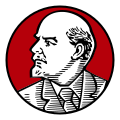A request that this article title be changed to Communism in Russia is under discussion . Please do not move this article until the discussion is closed. |
| Part of a series on |
| Communism |
|---|
 |
The first significant attempt to implement communism on a large scale occurred in Russia following the February Revolution of 1917, which led to the abdication of Tsar Nicholas II after significant pressure from the Duma and the military.[ citation needed ] After the abdication, Russia was governed by a provisional government composed of remnants of the dissolved Duma and the soviets—workers’ and soldiers’ councils—in a power sharing system known as dvoevlastie (dual power). Later that year, the Bolsheviks, led by Vladimir Lenin, seized power in the October Revolution and established the Russian Soviet Republic. After the Russian Civil War ended in 1922, the Bolsheviks formally established the Union of Soviet Socialist Republics (USSR), with Lenin as its first leader.
Contents
- Russian Revolution
- February Revolution
- October Revolution
- The Civil War
- Soviet socialism
- Collapse of the Soviet Union
- Cuba and the Cold War
- Modern Russia
- Organizations
- See also
- References
Throughout the 20th century communism spread to various parts of the world, largely as a result of Soviet influence, often through revolutionary movements and post-World War II geopolitical shifts. The Cold War period saw a global ideological struggle between the communist bloc, led by the Soviet Union, and the capitalist West, led by the United States. The eventual dissolution of the Soviet Union in 1991 marked a significant decline in the global influence of communism, though the ideology persists in some countries and continues to inspire political movements worldwide. [1]
Efforts to build communism in Russia began after the success of the February Revolution in 1917, and ended with the dissolution of the USSR in 1991. The Provisional Government was established under the liberal and social-democratic government; however, the Bolsheviks refused to accept the government and revolted in October 1917, taking control of Russia. Vladimir Lenin, their leader, rose to power and governed between 1917 and 1924.
The Communist Party of the Russian Federation remains the second-largest political party after United Russia.
